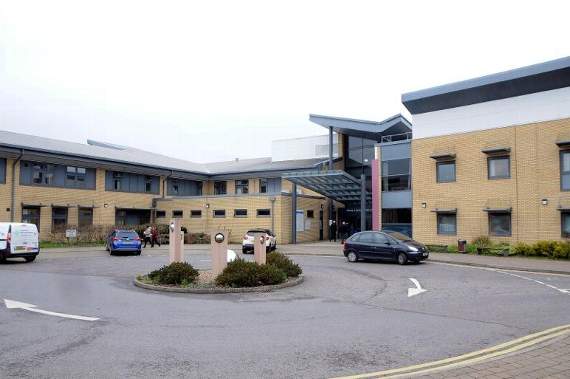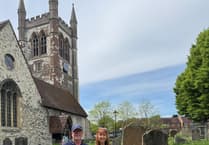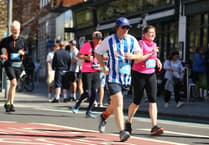WITH the National Health Service set to turn 70 on July 5, Farnham’s very own trailblazing health service is also marking its own first anniversary this month - driving forward one of the most significant change programmes in the history of the NHS.
Bringing together multiple health disciplines under one roof in Farnham Hospital’s former renal dialysis unit, the Farnham Integrated Care Service was launched in June 2017 as part of one of 50 NHS Vanguard programmes across the country, developing new care models to act as blueprints for the NHS moving forward.
Much has been learned over the past 12 months, and although the Vanguard programme (and its assurance of funding) has now come to an end, Farnham Integrated Care Service continues to go from strength to strength and has ambitious plans to offer patients in Farnham an even greater array of joined-up healthcare services right on their doorstep.
The “jewel in the crown” of the new service - as proclaimed by Dr Niloufer Ebrahim, clinical lead for integrated care at the North East Hampshire and Farnham NHS Clinical Commissioning Group - is its innovative approach to urgent care, offering a new, streamlined way of accessing same-day GP appointments for the 32,000 patients of Farnham’s three largest GP practices: Downing Street, Farnham Dene, and River Wey.
But Farnham Integrated Care Service has become much more than just a same-day service since its launch - now offering evening and Saturday GP appointments, as well as piloting the latest generation of hybrid health and well-being practitioners, focused on ensuring patients receive the most appropriate level of care quicker and, if possible, out of hospital.
These range from a team of community paramedics responsible for visiting patients in their homes to a musculoskeletal practitioner (a kind of ‘super physio’), an advanced nurse practitioner, and a weekly clinic by a Frimley Park-based dermatologist - with future plans to add a geriatrician and a cohort of practice nurses to its roster.
These have helped reduce referrals to Frimley Park and, alongside similar facilities in Farnborough, Aldershot, Fleet and Yateley, is credited with contributing to a drop in A&E attendance at Frimley Park - bucking the national trend.
The same-day service has also significantly relaxed the pressure on Farnham Integrated Care Service’s partner GP practices - allowing the introduction of extended, 15-minute appointments for patients with longer-term, complex conditions.
GPs can also now rely on Farnham Integrated Care Service’s paramedics to undertake many of their home visits for them, instead of squeezing these into their lunch breaks.
Doctors from each of the three GP practices take it in turns to staff the same-day service - each typically completing one four-hour session at the service every week, during which the duty doctor literally dons the “purple hat”, signifying their responsibility for making decisions about the level of care each patient should receive.
The same-day service is typically staffed by between four and six clinicians at any given time from 8am to 6.30pm Monday to Friday - with evenings (6.30pm to 8pm) and Saturday mornings usually reserved for specialist clinics. On average, Farnham Integrated Care Service welcomes between 120 and 200 patients every day.
Only patients registered at Farnham Dene, Downing Street and River Wey are currently able to use the service, however, and must book an appointment through their normal practice reception team.
Another practice, The Ferns, was initially involved in the same-day service but has since stepped away “to regroup” following the retirement of three of its partners. The Ferns does, however, along with Holly Tree Surgery in Boundstone, remain part of Farnham Integrated Care Service’s extended access model, offering evening and weekend appointments.
“From my point of view Farnham Integrated Care Service has been an overwhelming success,” said Dr Ebrahim, who as well as her role at the clinical commissioning group is a GP at Farnham Dene.
“It’s been fantastic at allowing patients an appointment on the day, and we are now seeing patients across the three practices that we might not normally have met, and we’re working with doctors and nurses that we might not have come across before. We are really building a good strong partnership through integrated working.
“There is a lot of discussion about care, lots of opportunities for education, and then when we go back to practice our normal surgeries are a lot more controlled because the same-day patients are being seen here, and therefore we have a lot more time and head space to deal with complex problems that are becoming increasingly common in general practice.
“It’s provided much better care for patients, and a much easier working life for the GP.”
She added: “By directing the urgent patients who would have presented in surgery before to Farnham Integrated Care Service, what we are doing now is opening up more appointments for those who need them.
“We have a lot of complex elderly patients in Farnham, and those patients need more than a 10-minute appointment.
“So we’re not just firefighting with those patients as we would before, we’re now looking into their problems, we’ve got time to deal with them and arrange social care or physio assessments, for example, so it’s proper integrated working.”
North East Hampshire and Farnham was one of just three clinical commissioning group areas announced as pilot schemes in the NHS Vanguard programme in 2015, and Farnham Integrated Care Service was one of the models of care trialled using the clinical commissioning group’s new pot of funding.
The Vanguard programme has since come to an end, however, and the clinical commissioning group now funds Farnham Integrated Care Service out of its general budget provided by NHS England, meaning the service must negotiate its settlement each year.
Jenny Partridge, practice manager at Farnham Dene, said: “When the clinical commissioning group was an NHS Vanguard, it had a pot of money to spend as they saw fit. Now if they want to fund this, they have to take the funding out of somewhere else.
“But our argument is you take it out of what you give to secondary care, because we’re doing a lot of secondary care’s work now in primary care.
“What we’re very keen to do is help people understand what the service is, help promote the message that patients love it, it’s great for patient care, so we can prove its effectiveness to help funding continue.
“This is seen as the way forward and it will continue in some form or other, but the issue is that funding decisions often get made fairly last minute because of politics, and that’s the frustration because you often can’t retain or recruit staff on that basis, even if it’s a good idea.”
One area that has been assured of long-term funding, however, is Farnham Integrated Care Service’s home visiting and proactive care service delivered by its pioneering community paramedics team.
The role of the community paramedic is a relatively new one to the NHS, and seeks to fill the gap between a district nurse and an ambulance worker, visiting people who are ill at home and can’t get in to the surgery but are not necessarily housebound.
The paramedics’ presence at the integrated care service also lends vital experience in emergency scenarios, and adds a preventative element to its service, using the latest software emerging in the NHS as well as good old -ashioned ‘boots on the ground’ to identify possible health issues before they develop into something more serious.
Liz Luttrell, one of two full-time community paramedics at Farnham Integrated Care Service, explained: “We essentially do home visiting on behalf of the GPs. We assess the patient, take their bloods, observations, a bit of a social thing as well, then we discuss what we find with the doctor and make a plan with regards to whether anything needs to be done - whether it’s medication, sometimes we need to send them into hospital, get social services involved, send them for various assessments, either at hospital or the surgery.
“It frees up the doctor to see more patients at the surgery, and when I worked in the ambulance service I very much enjoyed this type of work, going out to see elderly people or people who were struggling in general, and didn’t necessarily need an ambulance or hospital, but needed a bit more support or even just a cup to tea.”
“It’s about doing the right thing, at the right time, with the right outcome,” added community paramedics manager and clinical proactive case lead Peter Glover, a veteran of 20 years in the ambulance service.
“It’s not just about keeping people out of hospital, but saying actually when patients need to go to Frimley, we get them there quicker. It’s about enhancing, equipping and enabling - they’re my three Es. Everything we do should be about enhancing patient care, equipping others to do their job better, and enabling patients to have a better outcome.”
Another of the key additions to Farnham Integrated Care Service has been that of a full-time musculoskeletal practitioner in April, who can not only treat patients with joint issues but can also order scans, perform steroid and joint injections, and facilitate an orthopaedic assessment with a surgeon - cutting the usual wait to see a less-qualified physio from 30 working days to just two or three weeks.
The integrated care service has also secured a weekly clinic with a Frimley Park-based dermatologist after recognising that a high percentage of its referrals to hospital were skin related, again cutting the waiting time to see a specialist from months to weeks, while Dr Ebrahim confirmed that Farnham Integrated Care Service also hopes to recruit a geriatrician from Frimley Park “to see what we can do for our frail and elderly patients”.
In addition, the care service secured funding for an ‘advanced nurse practitioner’ in mid-November to ease the pressure on the same-day service over winter, and such was its success that in January the service hired experienced locum nurse practitioner Michael Lucero.
Michael has a unique perspective on the care service having worked for numerous NHS trusts during his career, including setting up his own rapid response team at St Mary’s Hospital, Sidcup.
“I’ve been to a lot of different trusts and the system here is very, very good, probably the best system I’ve worked in so far,” he said.
“Patient satisfaction is very high and to have so many different surgeries doing the same things, singing the same songs and collaborating is a brilliant idea.
“There is no other service like this. I have my own minor injuries clinic at Kingston A&E, and of the patients I see 80 per cent could be seen in a GP service. Without this in Farnham, most likely those patients would be there waiting in A&E for four hours or so.”
Farnham Integrated Care Service is also helping pilot the role of physician’s associates, combining the traditional job of a junior doctor with that of a nurse, and has already hosted a number of health and wellbeing events at the Farnham Maltings as well as the hospital, to raise awareness of key health issues facing Farnham’s ageing population - the next of which will take place in September focusing on respiratory illnesses.
“Patients love it,” continued Jenny. “We have got lots and lots of compliments, we do regular surveys and it’s very very positive.
“The one thing some people don’t like is that we’re very clear this is not a walk-in service. Patients have to register and talk to their GP to get an appointment, go through the system, which is deliberate because it helps regulate demand and redirect people to pharmacy or hospital or whatever. But, overall, patient feedback has been really positive.”
Dr Ebrahim added: “The feeling up at the clinical commissioning group is very much that the project has been great,
and now Vanguard has finished, and this is very much business as normal for us.
“Farnham has had great leadership and great support from the community and the practices, and there is a lot of momentum here to get things done from the top.
“There are similar services around, but Farnham Integrated Care Service is very much cutting edge because what the clinical commissioning group did is let the ICT leaders develop what they felt was needed locally.”




.jpg?width=209&height=140&crop=209:145,smart&quality=75)
Comments
This article has no comments yet. Be the first to leave a comment.